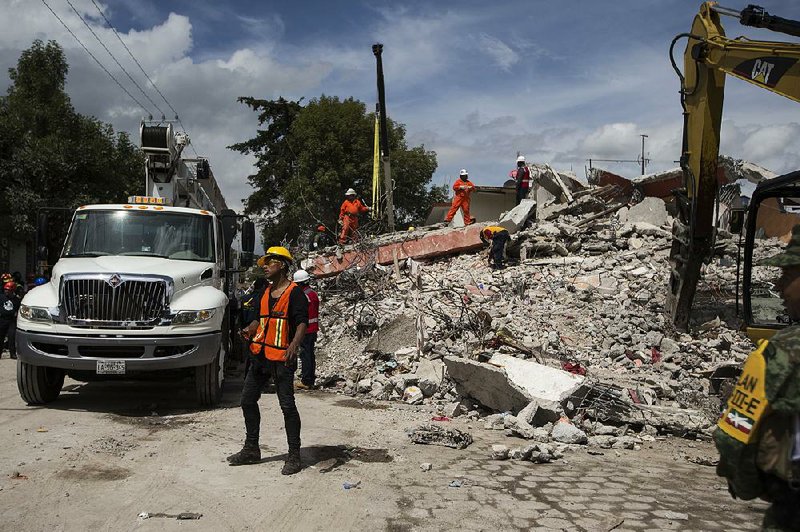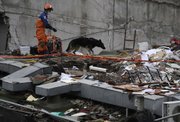MEXICO CITY -- Rescue operations stretched into a fourth day Friday after the extraction of survivors from the rubble in Mexico City, which spurred hope among desperate relatives gathered at the sites of buildings collapsed by a magnitude 7.1 earthquake.
Mexico's federal police said several people were lifted out of the debris of two buildings Thursday. Rescuers removed or broke through slabs until they found cracks that allowed workers to wiggle through to reach the victims and lift them to safety. The city government said 60 people in all had been rescued since the quake hit midday Tuesday.
The official death toll stood at 293, with more than half, 155, in the capital. National Civil Defense chief Luis Felipe Puente tweeted early Friday that there were also 73 deaths in the state of Morelos, 45 in Puebla, 13 in Mexico, six in Guerrero and one in Oaxaca.
Mexico City's morgue service said eight foreigners were among the city's dead.
Click here for larger versions
Photos by The Associated Press
Photos by The Associated Press
The city's justice tribunal said Friday that the dead include four Taiwanese women. A South Korean man was also confirmed dead, as was a Panamanian woman, a Spanish man and an Argentinean.
At the site of a quake-collapsed seven-story building in Mexico City's Roma Norte neighborhood, rescue efforts were suspended overnight as rain drenched the area and destabilized the pile of rubble.
Workers were eager to restart Friday morning under overcast but dry conditions -- as soon as experts could confirm it was safe to do so.
Jose Gutierrez, a civil engineer who has a relative believed trapped in the wreckage of the building and was working with the brigades, gathered other families of the missing amid an ad-hoc campsite of tents, tarps and plastic chairs to let them know what was going on. A list of 46 names of missing people was attached to a nearby lamppost.
"My family is in there. I want them to get out," Gutierrez said, his voice breaking with emotion. "So ... we go onward."
Wrapped in a blanket, Cristal Estrada paced back and forth near the tent where she spent the night on the street and worried about her missing brother Martin, a 31-year-old accountant married with two children including a 4-month-old baby girl. She said she was frustrated not being able to personally go help remove the rubble.
"They keep telling us there is life in there, but we keep on waiting," Estrada said. "There is life, yes, but we do not know if it is my brother's."
"They do not have much time in there," she added.
Rescuers from countries including the United States, Israel, Japan and Panama were at the site.
Meanwhile, the time was nearing for bulldozers to clear rubble and replace the delicate work of rescuers, though officials went to great pains to say it was still a rescue operation.
Puente, the national civil defense chief, acknowledged that backhoes and bulldozers were starting to clear away some wrecked buildings where no one had been detected or where teetering piles of rubble threatened to collapse on neighboring structures.
"It is false that we are demolishing structures where there could be survivors," Puente said. "The rescue operations will continue, and they won't stop."
Those who witnessed the buildings collapse said the tragedy could have been much worse. Some buildings didn't fall immediately, giving people time to escape, and some shattered but left air spaces where occupants survived.
In other cases, the salvation seemed almost miraculous.
Security guard Felix Giral Barron said that after the quake started, he had time to run and tell people to evacuate his building. Then an entire apartment building across the street crumbled and a big tank of heating gas on its roof slid off, but didn't explode.
Among the biggest disappointments was the dashing of one of the most dearly held hopes -- that a young girl trapped in a collapsed school had been detected alive by rescuers.
Since early Wednesday, the nation's attention had been glued to the effort to free the girl from the rubble of the school in southern Mexico City. Rescuers told reporters that the child, identified only as Frida Sofia, had signaled she was alive by wiggling her fingers. Rescuers said they even spoke with her.
The child became a symbol of hope, but no family members came forward to identify the girl, and officials said no student by that name was registered at the school.
On Thursday afternoon, navy Assistant Secretary Enrique Sarmiento announced that while there were blood traces and other signs suggesting someone could be alive beneath the school, all of its students had been accounted for.
"We have done an accounting with school officials and we are certain that all the children either died, unfortunately, or are in hospitals or are safe at their homes," Sarmiento said.
Sarmiento said the only person still listed as missing was a school employee. Several dead people have been removed from the rubble, and it could have been their fingers rescuers thought they saw move.
Later Thursday, Sarmiento was less categorical, saying that if anyone was still trapped it could be an adult or a child.
Information for this article was contributed by Mark Stevenson of The Associated Press.
A Section on 09/23/2017

